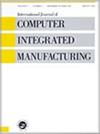The deep learning-based equipment health monitoring model adopting subject matter expert
IF 3.7
3区 工程技术
Q2 COMPUTER SCIENCE, INTERDISCIPLINARY APPLICATIONS
International Journal of Computer Integrated Manufacturing
Pub Date : 2023-09-15
DOI:10.1080/0951192x.2023.2257665
引用次数: 0
Abstract
ABSTRACTThe emergence of Industry 4.0 has led to the development of modern production machines that are usually equipped with advanced sensors to collect data for further analysis. This study proposes a deep learning-based framework to perform equipment health monitoring (EHM) and further broadens its applicability through the integration of subject matter expert (SME) knowledge. A sliding window strategy was adopted to perform EHM in real time. Moreover, an autocorrelation function (ACF) and a partial autocorrelation function (PACF) were employed to determine the optimal window size based on the elbow method. An empirical study was conducted to demonstrate the effectiveness and practicality of the proposed framework. Furthermore, to provide better prediction results, an optimal combination of hyperparameters that minimized the loss function and further validated the window size obtained by the ACF and PACF was determined and used. The results showed that the proposed algorithm outperformed other representative machine learning models. Finally, a general framework was adopted to maintain equipment performance.KEYWORDS: Deep learningequipment health monitoringsliding windowautocorrelation function (ACF)partial autocorrelation function (PACF)subject matter expert (SME) AcknowledgementsThe author would like to acknowledge a very good collection of data from Hsiang-Po Tsai and the support from Hong-Yi Huang.Disclosure statementNo potential conflict of interest was reported by the author(s).Additional informationFundingThis work was supported by Ministry of Science and Technology of Taiwan under Grant 109-2222-E-035-007- and 110-2221-E-005-087-.采用主题专家的基于深度学习的设备健康监测模型
摘要工业4.0的出现导致了现代生产机器的发展,这些机器通常配备了先进的传感器来收集数据以进行进一步分析。本研究提出了一个基于深度学习的框架来执行设备健康监测(EHM),并通过整合主题专家(SME)知识进一步扩大其适用性。采用滑动窗口策略实时执行EHM。在此基础上,利用自相关函数(ACF)和部分自相关函数(PACF)确定了基于肘形法的最佳窗口大小。实证研究证明了该框架的有效性和实用性。此外,为了提供更好的预测结果,确定并使用了最小化损失函数并进一步验证ACF和PACF获得的窗口大小的超参数的最优组合。结果表明,该算法优于其他具有代表性的机器学习模型。最后,采用了维护设备性能的总体框架。关键词:深度学习;设备健康监测;滑动窗口自相关函数(ACF);偏自相关函数(PACF);主题专家(SME)致谢作者要感谢蔡香波(Hsiang-Po Tsai)提供的非常好的数据收集和黄弘毅(Hong-Yi Huang)的支持。披露声明作者未报告潜在的利益冲突。本研究由台湾科学技术部资助,项目为109-2222-E-035-007-和110-2221-E-005-087-。
本文章由计算机程序翻译,如有差异,请以英文原文为准。
求助全文
约1分钟内获得全文
求助全文
来源期刊
CiteScore
9.00
自引率
9.80%
发文量
73
审稿时长
10 months
期刊介绍:
International Journal of Computer Integrated Manufacturing (IJCIM) reports new research in theory and applications of computer integrated manufacturing. The scope spans mechanical and manufacturing engineering, software and computer engineering as well as automation and control engineering with a particular focus on today’s data driven manufacturing. Terms such as industry 4.0, intelligent manufacturing, digital manufacturing and cyber-physical manufacturing systems are now used to identify the area of knowledge that IJCIM has supported and shaped in its history of more than 30 years.
IJCIM continues to grow and has become a key forum for academics and industrial researchers to exchange information and ideas. In response to this interest, IJCIM is now published monthly, enabling the editors to target topical special issues; topics as diverse as digital twins, transdisciplinary engineering, cloud manufacturing, deep learning for manufacturing, service-oriented architectures, dematerialized manufacturing systems, wireless manufacturing and digital enterprise technologies to name a few.

 求助内容:
求助内容: 应助结果提醒方式:
应助结果提醒方式:


